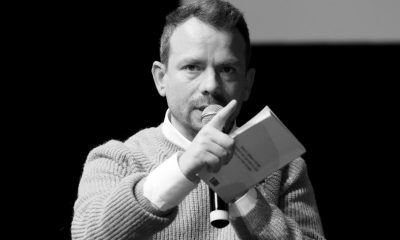EU
#ЕАПМ - Ажурирање: Европа је за виталне анкете постављена у мају

 Not surprisingly, the big news items in Europe politically this year are likely to be the fall-out from Brexit, assuming it happens as scheduled on 29 March, and the European elections in May, which will see a drop in the number of MEP seats as the UK departs after more than 45 years as a member of the union, пише Европска Алијанса за Персоналисед Медицине (ЕАПМ) извршни директор Денис Хорган.
Not surprisingly, the big news items in Europe politically this year are likely to be the fall-out from Brexit, assuming it happens as scheduled on 29 March, and the European elections in May, which will see a drop in the number of MEP seats as the UK departs after more than 45 years as a member of the union, пише Европска Алијанса за Персоналисед Медицине (ЕАПМ) извршни директор Денис Хорган.
The number of MEPs will go from the current 751 to 705, with 46 of the 73 UK seats available for possible EU enlargement down the line. The remaining 27 UK seats will be shared out among 14 other member states, which are currently viewed as under-represented.
In the run-up to the elections, most of the parties have named their candidates. Readers may well have heard the term ‘Spitzenkandidaten’. So what exactly does it mean?
Well, the Treaty of Lisbon makes it clear that the result of the European Parliament elections should be taken into account by the European Council, when it proposes a candidate for the post of European Commission President (currently held by Jean-Claude Juncker, who will not stand again).
The nominee then goes to the European Parliament for approval (as do all proposed Commissioners) with the institution voting by majority. This provision in the Lisbon Treaty has led to the Spitzenkandidaten process, which translates as ‘lead candidate’.
Each political group nominates its candidate for the position of European Commission President before the elections, with the candidate from the most-voted-for political group being nominated by the European Council and supported by the European Parliament for the post of Commission President. Well, that’s the theory. But there has to be consensus among the political groups.
Parliament, in February of last year, called for the Spitzenkandidaten process to be applied in this year’s elections, and stated that it will not support any candidate for European Commission President who has not been designated using the method.
Again, it’s still all theoretical in that the European Council is not actually bound by the treaties to follow the process and can actually put forward another candidate who the Parliament could, of course, still reject. Think smoke-filled dark rooms and kingmakers…
Four of the major European political parties from the EPP, PES, ALDE, Greens and ECR, have already announced that they’ll support the Spitzenkandidat system. These have already proposed theircandidate, with the exception so far being ALDE - the Alliance of Liberals and Democrats in Europe.
As this publication was being finalized, potential ALDE candidates included its leader in the European Parliament Guy Verhofstadt (busy with Brexit, of course), plus EU Commissioners Margrethe Vestager and Cecilia Malmström. In the run-up to May’s vote, the Parliament’s President Antonio Tajani and the European Economic and Social Committee (EESC) will be undertaking a series of actions to raise awareness among civil society organizations and the public about the European elections and hopefully drive more citizens to the polls.
Tajani said: "The European Parliament is committed to responding to the needs and priorities of citizens - especially on jobs, growth, security, migration and climate change. We all have a stake in these elections and we have a duty to inform.”
“The EESC can play a key role in engaging social partners and wider civil society in this election campaign that will determine the future of Europe,” he added.
The European Alliance for Personalised Medicine will of course be following the whole pre- and post-election process. Who are the parties’ choices and what are they saying? Let’s start with the European Conservatives and Reformists Group, or ECR, which is joining forces with Debout la France for the elections to form what has been described as a ‘Euro-realist’ group.
Its shared goals include “the urgent need to respond to the common challenges of immigration, security and the economy through a profound reform of the European institutions that puts national democracies at the centre of decision-making”. As it stands, the ECR is the 3rd largest group in Parliament, with 74 MEPs representing 19 countries.
Nicolas Dupont-Aignan, a member of the National Assembly in France and a candidate in 2017 in the presidential election said: "For the first time since the start of direct elections to the European Parliament, Euro-realist political forces can be the majority in the European Parliament and finally put these institutions at the service of the people.”
“We are determined to gather after the European elections an enlarged group capable of making a difference,” he added. The ECR has chosen Czech Republic MEP Jan Zahradil, who is also the President of the Alliance of Conservatives and Reformists in Europe (ACRE), as their spitzenkandidat.
After being endorsed, Zahradil said: "We didn't invent the spitzenkandidat process but once it’s here, we want to take the opportunity to communicate our programme, principles and plans to the public.”
Meanwhile, the president of the Group of Socialists and Democrats (S&D), Udo Bullmann, took part in the PES Congress in Lisbon back in December together with a strong delegation of S&D MEPs.
The PES has named its Common Candidate as Frans Timmermans. The Dutch politician is currently First Vice-President of the European Commission and Commissioner for Better Regulation, Inter-institutional Relations, the Rule of Law and the Charter of Fundamental Rights. He’s held this position since 2014.
Bullman said in Lisbon: “Frans Timmermans has proven to be a real fighter for our goals and values. I am convinced that with him as our lead candidate, we have the best chance to rise to the challenges ahead of us.”
Late last year, the Centre-Right European People's Party (EPP) approved the nominations of Alexander Stubb and Manfred Weber as their potential candidates. The party in the end elected Weber, a German, as its Spitzenkandidat by a landslide majority during its Congress in Helsinki, Finland, in November.
On the basis that the EPP is expected to win the most seats in the next European Parliament, Weber is certainly in the frame.
For its part, the European Green Partyelected Ska Keller of the German Greens Bündnis 90/Die Grünen and Bas Eickhout of the Dutch Greens GroenLinks as its (pitzenkandidaten at a European Greens' Council in Berlin. The party traditionally fields two leaders.
Eickhout is a member of the European Parliament and Keller is the current co-president of the Greens/EFA Group in the European Parliament. After the vote, Ska Keller said: “As Greens, we have a big responsibility in the upcoming elections. Europe is under attack from far-right parties, some in government, who want to go back to nationalism and curb civil liberties and democracy.
"As Greens, we stand to defend Europe and its values. We want to make Europe more ecological, social and democratic so that it can fulfil its promises. There is much at stake at the coming elections. As Greens we will show that we can lead with a positive vision of Europe. These times need courage and we stand ready.”
Commission plans for 2019
The Berlaymont has set out three main priorities for this year ahead, the last of the current Commission’s mandate. It says it wants to reach quick agreement on legislative proposals already under way, adopt a limited number of new initiatives to address outstanding challenges, and present several initiatives with a future perspective for a European Union of 27 member states that will reinforce the foundations for a strong, united and sovereign Europe.
Jean-Claude Juncker, in his last year as Commission president, said: "Europe will have its most important rendezvous with voters for a generation, at the European elections.
“I call on the European Parliament and the Council to adopt the proposals presented by the Commission in the past four years.
“Citizens do not care about proposals, they care about laws in force that give them rights. There would be no better message to voters taking to the polls…than if we were to demonstrate that this Union delivers concrete, tangible results for them.”
MEPs to watch
The following MEPs will stand for re-election and all have been involved in the health-care agenda in one form or another. Carlos Zorrinho, of the Progressive Alliance of Socialists and Democrats, is a mover and shaker in respect of Digital Europe, while Alojz Peterle, of the EPP, is a cancer survivor and has worked for years in that disease area. He is often to be seen at EAPM events.
Miriam Dalli, also of the Progressive Alliance of Socialists and Democrats, focusses on innovation and personalised health care, and is interviewed in this publication, while the EPP’s Seán Kelly, works in the area of data empowerment. Meanwhile, another EAPM supporter Sirpa Pietikäinen, also of the EPP, champions the rights of patients as part of her work in Brussels and Strasbourg.
Поделите овај чланак:
-

 НАТОПре КСНУМКС дана
НАТОПре КСНУМКС данаЕвропски парламентарци пишу председнику Бајдену
-

 КазахстанПре КСНУМКС дана
КазахстанПре КСНУМКС данаПосета лорда Камерона показује значај Централне Азије
-

 ДуванПре КСНУМКС дана
ДуванПре КСНУМКС данаТобаццогате се наставља: интригантан случај Дентсу праћења
-

 ДуванПре КСНУМКС дана
ДуванПре КСНУМКС данаПрелазак са цигарета: како се добија битка за ослобађање од пушења






















